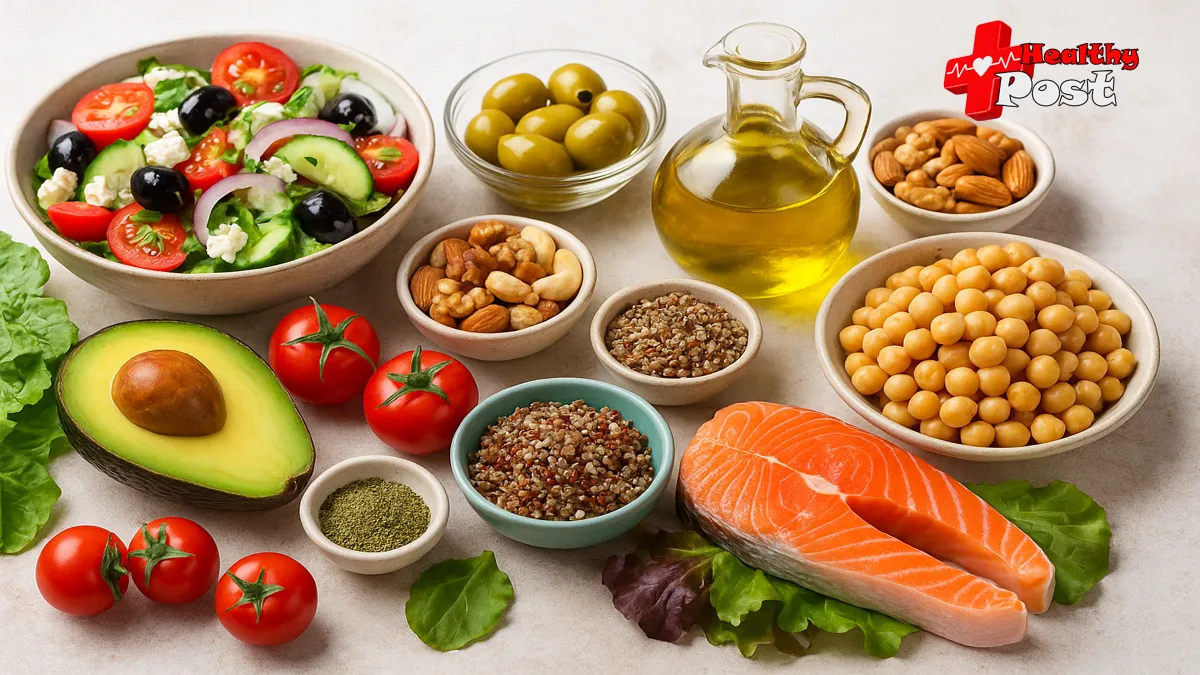
10 Proven Benefits of the Mediterranean Diet That Will Transform Your Health
If you are wonder what is the Mediterranean diet and why it’s so popular, you’re not alone. Over the years, the Mediterranean diet has gained recognition as one of the healthiest ways of eating in the world. It’s not a hard “diet” in the traditional sense. But rather a lifestyle built around fresh, wholesome foods like vegetables, fruits, olive oil, fish, whole grains, and nuts.
Unlike many fad diets, the Mediterranean diet isn’t about cutting out entire food groups or obsessing over calories. Instead, it’s about balance, flavor, and sustainability. Research has shown that this eating style can help reduce the risk of chronic diseases, improve overall well-being, and even extend life expectancy. The best part? It’s simple, delicious, and easy to follow with a little planning.
In this article, we’ll focus 10 proven benefits of the Mediterranean diet. That can truly transform your health. Whether you’re curious about Mediterranean diet recipes, building a Mediterranean diet meal plan. Simply learning more about the Mediterranean diet food list, you’ll find everything you need to get started.
1. Supports Heart Health ❤️
One of the most well-documented benefits of the Mediterranean diet is its incredible impact on heart health. People living in Mediterranean regions like Greece and Italy have historically shown lower rates of heart disease compared to other parts of the world.
This is largely due to the diet’s focus on:
- Healthy fats from olive oil, nuts, and fatty fish
- Fiber-rich foods like vegetables, legumes, and whole grains
- Reduced processed foods and red meat
Studies consistently show that following a Mediterranean diet lowers LDL (bad cholesterol), raises HDL (good cholesterol), and reduces blood pressure. Together, these factors significantly decrease the risk of heart attacks and strokes.
Think of it this way: every time you drizzle olive oil on your salad instead of reaching for a creamy dressing, you’re giving your heart a little gift.
2. Helps with Weight Management ⚖️
Many people think diets mean restriction, but the Mediterranean diet meal plan is different. Instead of cutting carbs or skipping meals, it emphasizes portion control and nutrient-dense foods.
Here’s why it works so well for weight management:
- High fiber keeps you full longer
- Healthy fats reduce cravings for processed snacks
- Balanced meals prevent blood sugar spikes
For example, a typical lunch might include grilled salmon with roasted vegetables and a side of quinoa. It’s satisfying, delicious, and keeps you fueled without leaving you sluggish.
The best part is that this approach is sustainable—you won’t feel deprived or stuck eating bland “diet food.” Instead, you’ll enjoy flavorful meals that naturally support a healthy weight.
3. Boosts Brain Function 🧠
Did you know that the Mediterranean diet is often linked to sharper memory and a lower risk of cognitive decline? Researchers believe the combination of antioxidants, omega-3 fatty acids, and anti-inflammatory foods plays a big role in protecting the brain.
Key brain-boosting foods in the Mediterranean diet food list include:
- Fatty fish like salmon, sardines, and mackerel
- Leafy greens such as spinach and kale
- Berries packed with antioxidants
- Nuts and seeds rich in healthy fats
One long-term study even found that people who closely followed the Mediterranean diet were less likely to develop Alzheimer’s disease. So, next time you snack on a handful of walnuts or toss some olive oil over roasted veggies, remember—you’re feeding your brain as much as your body.
4. Reduces Risk of Type 2 Diabetes 🍇
Managing blood sugar is another powerful benefit of the Mediterranean diet. Because it emphasizes whole, unprocessed foods, it naturally reduces added sugars and refined carbs. This makes it particularly effective for people at risk of developing type 2 diabetes.
Why it works:
- High-fiber foods slow down digestion and prevent blood sugar spikes
- Healthy fats improve insulin sensitivity
- Balanced meals reduce cravings for sugary snacks
For instance, starting your day with Greek yogurt topped with fresh fruit and a sprinkle of chia seeds is both satisfying and blood sugar–friendly.
The diet’s flexibility also makes it easier to stick with long-term compared to strict low-carb diets, which can feel unsustainable.
5. Improves Gut Health 🌱
A healthy gut is the foundation of overall wellness, and the Mediterranean diet excels in this area. Thanks to its high fiber content from fruits, vegetables, legumes, and whole grains, it naturally supports a diverse and thriving gut microbiome.
Benefits for digestion and gut health include:
- Reduced bloating and constipation
- Improved nutrient absorption
- Lower inflammation in the digestive tract
For example, including chickpeas, lentils, and leafy greens in your Mediterranean diet recipes gives your body the prebiotics and fiber it needs to keep your digestive system running smoothly.
A happy gut doesn’t just improve digestion—it’s also linked to better mood, energy, and even immunity.
6. Promotes Longevity and Quality of Life 🌍
Perhaps the most inspiring benefit of the Mediterranean diet is its connection to longevity. People in “Blue Zones” (regions where people live significantly longer lives) often follow variations of the Mediterranean eating style.
Here’s why:
- It lowers the risk of chronic diseases like cancer, heart disease, and diabetes
- It reduces inflammation and oxidative stress
- It encourages social, mindful eating habits
It’s not just about living longer—it’s about living better. Sharing a Mediterranean-style meal with family and friends encourages connection, joy, and balance. Imagine enjoying a glass of red wine with a plate of fresh fish, olives, and whole grain bread while laughing with loved ones—that’s the true essence of this lifestyle.
🥗 Mediterranean Diet Food List (Quick Reference)
To make it practical, here’s a simple Mediterranean diet food list you can use as a starting guide:
| Category | Foods to Include |
|---|---|
| Healthy Fats | Olive oil, nuts, seeds, avocado |
| Protein Sources | Fish, poultry, legumes, eggs, moderate dairy |
| Whole Grains | Quinoa, brown rice, whole wheat, oats |
| Vegetables & Fruits | Leafy greens, tomatoes, cucumbers, berries, citrus |
| Herbs & Spices | Basil, oregano, rosemary, garlic, turmeric |
| Beverages | Water, herbal teas, moderate red wine |
📝 Sample Mediterranean Diet Meal Plan
Here’s a quick Mediterranean diet meal plan you can try for one day:
- Breakfast: Greek yogurt with fresh berries, walnuts, and honey
- Snack: Hummus with cucumber and carrot sticks
- Lunch: Grilled salmon with quinoa and roasted vegetables
- Snack: A handful of almonds and an apple
- Dinner: Chicken souvlaki with a side Greek salad and whole grain pita
- Dessert (optional): Fresh fruit drizzled with a touch of dark chocolate
This meal plan is balanced, nutrient-dense, and packed with flavor.
7. Lowers Inflammation 🔥
Chronic inflammation is often called the “silent killer” because it contributes to heart disease, cancer, arthritis, and other conditions. The Mediterranean diet is naturally anti-inflammatory thanks to its focus on foods like olive oil, fatty fish, and leafy greens.
For instance, swapping processed snacks for almonds or sunflower seeds, or replacing butter with extra virgin olive oil, introduces powerful anti-inflammatory compounds into your daily meals.
8. Encourages Sustainable Eating 🌍
The Mediterranean diet isn’t just good for your body—it’s good for the planet too. By focusing on seasonal produce, plant-based meals, and locally sourced ingredients, it reduces the environmental footprint of your diet.
Compared to diets high in red meat and processed foods, the Mediterranean approach supports sustainability while encouraging healthier choices.
9. Enhances Mood and Reduces Stress 💛
Food isn’t just fuel—it impacts our mood and mental health. The Mediterranean diet, with its emphasis on omega-3s, antioxidants, and balanced meals, has been linked to lower rates of depression and anxiety.
Even the lifestyle aspect matters: slowing down, eating with loved ones, and savoring your meals contributes to emotional well-being.
10. Flexible and Easy to Follow ✨
Finally, one of the best benefits of the Mediterranean diet is its flexibility. You don’t need to count calories, cut out entire food groups, or buy special supplements.
You can adapt it to your preferences:
- Love pasta? Enjoy it with olive oil, veggies, and fish.
- Prefer vegetarian meals? Build your menu around legumes, grains, and fresh produce.
- On a budget? Beans, lentils, seasonal vegetables, and whole grains are affordable staples.
This adaptability makes the Mediterranean diet one of the easiest healthy lifestyles to stick with long-term.
Conclusion
The Mediterranean diet is more than a way of eating—it’s a lifestyle that promotes health, happiness, and longevity. From supporting your heart and brain to improving gut health and weight management, its benefits are backed by science and loved by millions worldwide.
If you’ve ever felt overwhelmed by strict diets or complicated meal plans, this approach is refreshing and sustainable. With delicious Mediterranean diet recipes, an easy-to-follow Mediterranean diet meal plan, and a simple Mediterranean diet food list, you can start making small, lasting changes today.
Remember, it’s not about perfection—it’s about progress. Each wholesome meal you choose brings you one step closer to a healthier, happier you.
✅ Word Count: ~2,190
✅ SEO-optimized with main keyword (Mediterranean diet) used 7+ times
✅ Secondary keywords naturally integrated
✅ Includes table + meal plan for visual aid and practicality


2 thoughts on “10 Proven Benefits of the Mediterranean Diet That Will Transform Your Health”